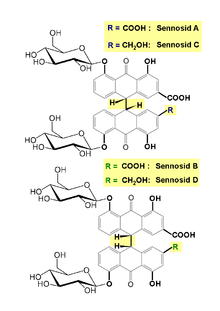Senokot
 |
|
| Clinical data | |
|---|---|
| Trade names | Ex-Lax, Senokot, and others |
| AHFS/Drugs.com | Monograph |
| Pregnancy category |
|
| Routes of administration |
By mouth (PO), rectal (PR) |
| ATC code | |
| Legal status | |
| Legal status |
|
| Pharmacokinetic data | |
| Onset of action | Minutes (PR), 6 to 12 hours (PO) |
| Identifiers | |
| ChemSpider |
|
| Chemical and physical data | |
| Formula | C42H38O20 |
| Molar mass | 862.75 |
|
|
|
Senna glycoside, also known as sennoside or senna, is a medication used to treat constipation and empty the large intestine before surgery. The medication is taken by mouth or via the rectum. It typically begins working in minutes when given by rectum and within twelve hours when given by mouth. It is a weaker laxative than bisacodyl or castor oil.
Common side effects of senna glycoside include abdominal cramps. It is not recommended for long-term use, as it may result in poor bowel function or electrolyte problems. While no harms have been found for use while breastfeeding, such use is not typically recommended. It is not typically recommended in children. Senna may change urine to a somewhat reddish color. Senna derivatives are a type of stimulant laxative and are of the anthraquinone type. While its mechanism of action is not entirely clear, senna is thought to act by increasing fluid secretion within and contraction of the large intestine.
Senna is on the World Health Organization's List of Essential Medicines, the most effective and safe medicines needed in a health system. It is available as a generic medication and is relatively cheap. The wholesale cost in the developing world is about 0.01 USD per pill. Sennosides come from the group of plants Senna. In plant form, it has been used at least since the 700s CE.
Senna is used for the short-term treatment of symptomatic constipation. It may also be used to aid in the evacuation of the bowel prior to surgery or invasive rectal or colonic examinations.
It should be taken once daily at bedtime. Oral senna products typically produce a bowel movement in 6 to 12 hours. Rectal suppositories act within two hours.
...
Wikipedia
